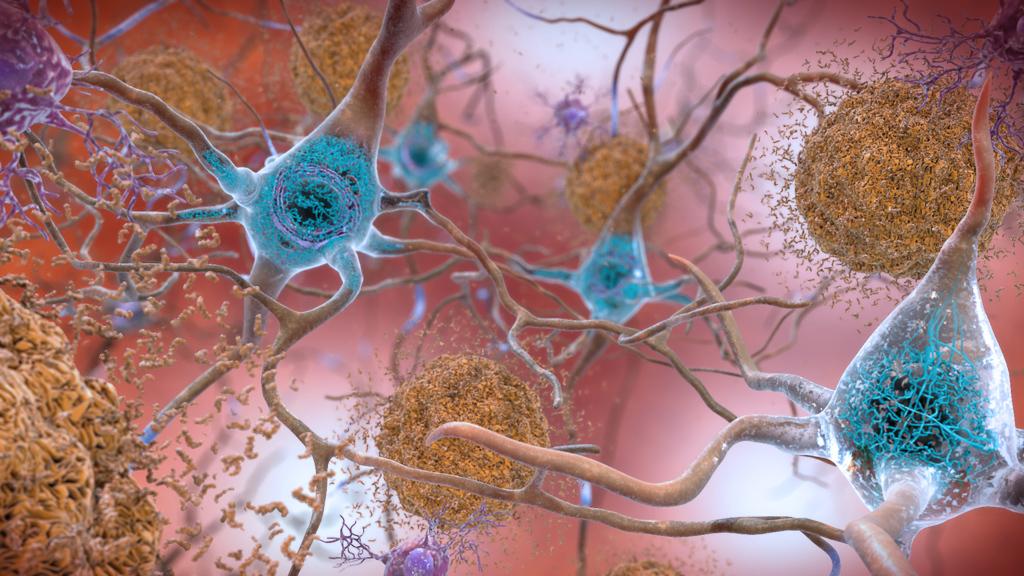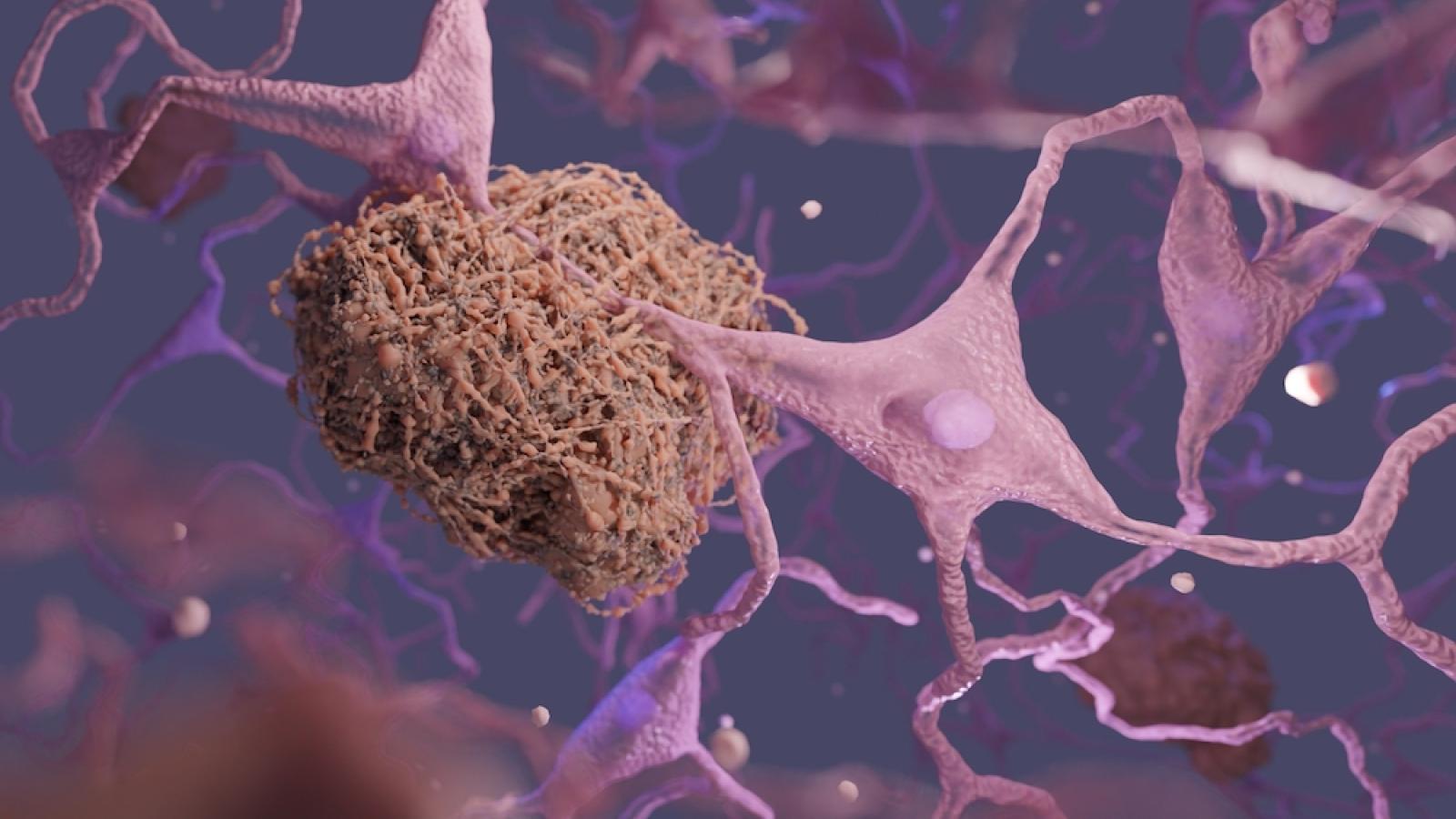Developing a better knowledge of how different risk factors interact in dementia
Although the causes of different types of dementia are not well understood, we know that each involves a complex mix of genetic, environmental and lifestyle factors. For instance, several ‘risk’ genes have now been identified that can influence a person’s chances of developing Alzheimer’s disease but don’t guarantee it. Developing a better knowledge of how different risk factors interact together to tip the balance from health to disease will be key to tackling different dementias.
The Elliott Lab is using powerful technologies that can measure hundreds of thousands of small molecules at a time, such as in blood or urine, to give an extraordinarily detailed snapshot of what’s going on inside a person’s body. By carrying out sophisticated data analyses of the molecular signatures from people taking part in large population studies looking into the risk factors for dementia, the team hopes to identify subtle shifts that associate with different types of the disease and link these with specific genetic, dietary or lifestyle factors.
The Elliott Lab hopes that this approach will build valuable insights into the molecular pathways involved in the development of different dementias, offering the potential for lifestyle and preventive measures, and new treatments that can delay or mitigate the occurrence of disease.
Latest news



Prof Paul Elliott
Prof Paul Elliott is a Group Leader at the UK DRI at Imperial. Find out more about his career and expertise on his profile page.

Research summary

Pathology in Alzheimer's disease. Credit: NIH
Linking genetic, epidemiology and metabolic phenotyping in dementia in the context of aging, environment and lifestyle
Alzheimer’s disease (AD) is characterised by a prolonged pre-clinical phase involving Aβ deposition but without the typical symptoms of cognitive impairment and dementia until relatively late on in the disease process. Although there is a well described genetic predisposition to AD, known genetic factors to date explain only a small proportion of the variance in AD occurrence. Little is known about the environmental, lifestyle and metabolic factors which, interacting with genetic background, determine who ultimately will go on to manifest clinical disease. Gaining knowledge of these risk factors is key to tackling the growing burden of AD, vascular and other dementias, as it offers the potential for lifestyle and preventive measures, and novel treatments, to delay or offset occurrence of clinical disease.
The ‘exposome’ concept captures the totality of internal and external exposures and their biological imprints, from a variety of sources including chemical and biological agents, gut microbial and dietary/lifestyle/psychosocial factors. These interact at a cellular and systems level to generate molecular signatures characteristic of health or disease that can be assessed through ‘omic technologies and biomarkers. Specifically, metabolomics, the metabolic profiling of small molecule metabolites, for example in blood or urine, is a powerful and innovative approach that captures in extraordinarily high-resolution direct signatures of the end-products of a wide range of physiological and pathophysiological processes. These signatures tend to be more closely associated with phenotypic expression than genes and proteins, whose function is subject to epigenetic regulation and post-translational modifications.
Main objectives and research goals:
The overall objective is to gain new knowledge on metabolic phenotypes and related metabolic pathways associated with cognitive decline or mild cognitive change (MCI), AD, vascular and other dementias, as well as cardio-metabolic, lifestyle and other putative risk factors. Specific aims are:
- To provide novel functional data and reveal metabolic pathways influenced by genetic signals for AD and other dementias. By investigating genome-wide association study findings in relation to the blood and urinary metabolome.
- To identify discriminatory metabolite signatures associated with cognitive change; sleep disturbance/shift work; incident MCI, AD and vascular dementia – and identify the dietary, social and lifestyle correlating factors. Through the statistical analysis of large patient cohort data.
- To structurally identify discriminatory metabolites. Using a range of chemometric, bioinformatic as well as analytic chemistry methods.
- To identify both common and specific pathways that underlie cognitive change, incident MCI, AD, vascular and other dementias. By placing the discovered metabolites into metabolic pathways using various statistical, chemometric and bioinformatic approaches.
- To identify underlying pathways and investigate the extent that the metabolic signals/pathways found in peripheral blood/urine also pertain in the brain. By measuring discovered and pathway-associated metabolites in CSF of people with MCI, AD and controls.
Key publications
Vacancies
Lab members
- Dr Abbas Dehghan (Principal Scientist)
- Dr Ioanna Tzoulaki (Principal Scientist)
- Dr Verena Zuber (Lecturer in Biostatistics)
- Dr Devendra Meena (Postdoctoral Researcher)
- Dr Rui Pinto (Postdoctoral Researcher)
- Dr Alex Smith (Postdoctoral Researcher)
- Dr Philippa Wells (Postdoctoral Researcher)
- Dr Georg Otto (Postdoctoral Researcher)
- Dr Elodie Yu (Postdoctoral Researcher)
- Terry Huang (Researcher)
- Fotios Koskeridis (Postdoctoral Researcher)
- Bowen Su (Research Assistant)
Collaborators





Lab funders
Thank you to all those who support the Elliott Lab!
